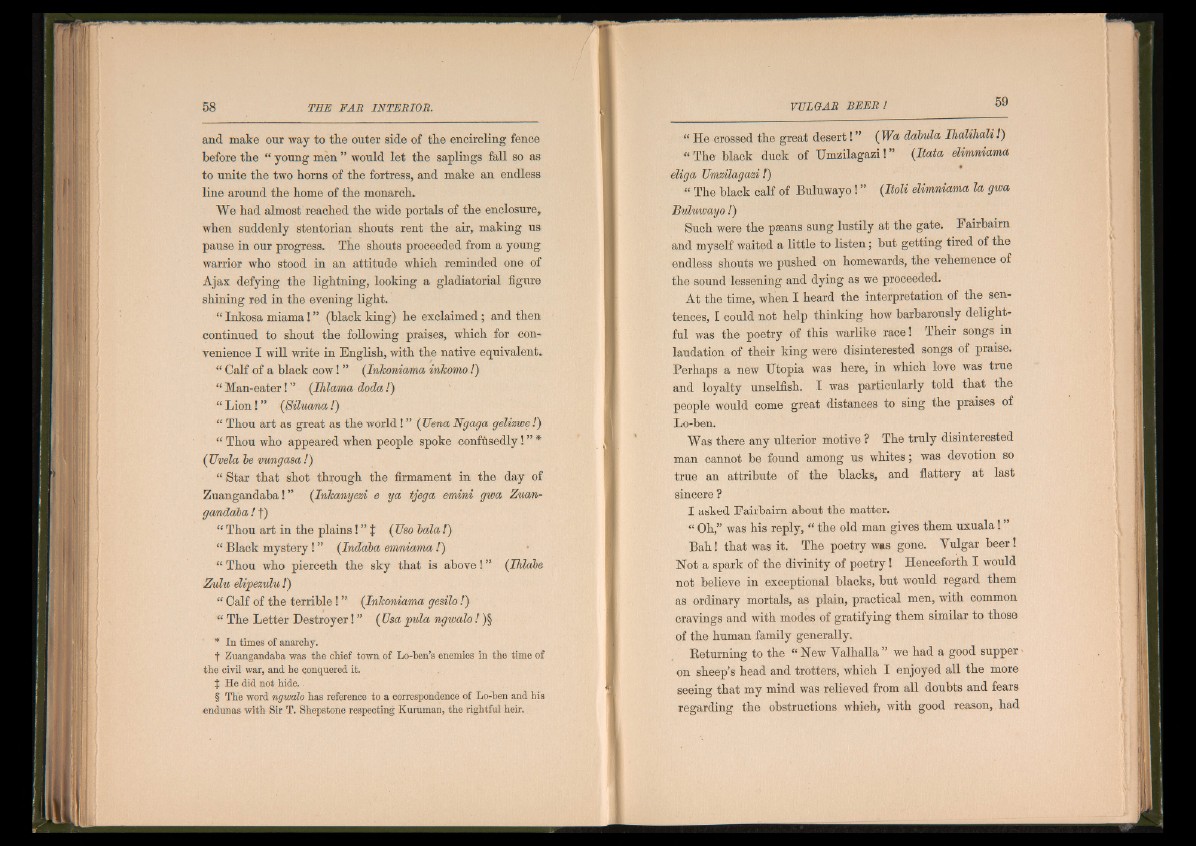
and make our way to the outer side of the encircling fence
before the “ young men ” would let the saplings fall so as
to unite the two horns of the fortress, and make an endless
line around the home of the monarch.
We had almost reached the wide portals of the enclosure,
when suddenly stentorian shouts rent the air, making us
pause in our progress. The shouts proceeded from a young
warrior who stood in an attitude which reminded one of
Ajax defying the lightning, looking a gladiatorial figure
shining red in the evening light.
“ Inkosa miama! ” (black king) he exclaimed ; and then
continued to shout the following praises, which for convenience
I will write in English, with the native equivalent.
“ Calf of a black cow! ” (Inkoniama inkomo!)
“ Man-eater! ” (Ihlama doda !)
“ Lion! ” (Biluana /)
“ Thou art as great as the world! ” (TJena Ngaga gelizwe !)
“ Thou who appeared when people spoke confusedly! ” *
(Uvela be vvmgasa!)
“ Star that shot through the firmament in the day of
Zuangandaba! ” (Inkanyezi e ya tjega emini gwa Zuangandaba
I f)
“ Thou art in the plains! ” t (Uso hala !)
“ Black mystery! ” (Indaba emniama /)
“ Thou who pierceth the sky that is above ! ” (Ihlabe
Zulu elipezvlu /)
“ Calf of the terrible! ” (Inkoniama gesilo /)
“ The Letter Destroyer! ” (Usa pula ngwalo! )§
* In times of anarchy.
f Zuangandaba was the chief town of Lo-hen’s enemies in the time of
the civil war, and he conquered it.
$ He did not hide..
§ The word ngwalo has reference to a correspondence of Lo-ben and his
endunas with Sir T. Shepstone respecting Kuruman, the rightful heir.
“ He crossed the great desert! ” (Wa ddbula Ihalihali /)
“ The black duck of Unmlagazi! ** (Itata elimniama
eliga Umzilagazi!)
“ The black calf of Buluwayo! ” (Itoli elimniama la gwa
Bulwwayo /)
Such were the p scans sung lustily at the gate. Fairbaim
and myself waited a little to listen; but getting tired of the
endless shouts we pushed on homewards, the vehemence of
the sound lessening and dying as we proceeded.
At the time, when I heard the interpretation of the sentences,
I could not help thinking how barbarously delightful
was the poetry of this warlike race! lhe ir songs in
laudation of their king were disinterested songs of praise.
Perhaps a new XJtopia was here, in which love was true
and loyalty unselfish. I was particularly told that the
people would come great distances to sing the praises of
Lo-ben.
Was there any ulterior motive ? The truly disinterested
man cannot be found among us whites; was devotion so
true an attribute of the blacks, and flattery at last
sincere ?
I asked Fairbairn about the matter.
“ Oh,” was his reply, “ the old man gives them uxuala!
Bah! that was it. The poetry was gone. Yulgar beer!
Not a spark of the divinity of poetry! Henceforth I would
not believe in exceptional blacks, but would regard them
as ordinary mortals, as plain, practical men, with common
cravings and with modes of gratifying them similar to those
of the human family generally.
Returning to the “ New Yalhalla” we had a good supper
on sheep’s head and trotters, which I enjoyed all the more
seeing that my mind was relieved from all doubts and fears
regarding the obstructions which, with good reason, had